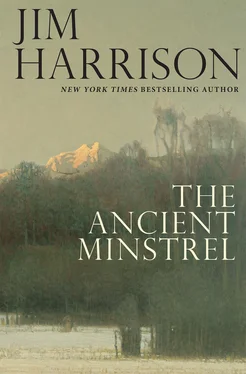Catherine was a dutiful daughter, if generally ignored as her parents hopelessly tried to manage her brother. She went to Sunday school voluntarily. Her parents were members of the Methodist Church in Livingston but never attended except at Christmas and Easter. She had a good teacher who had told her to pick the same place to pray each morning. She couldn’t quite manage it. At home in town she’d go out to a thicket of Russian olive and aspen trees or, if the weather was too bad, down to her secret place in the basement where she had an altar covered with her favorite stones, arrowheads, a pretty white coyote skull, and her first teddy bear. She loved the Gospels and read them often and still did. At the farm she’d say her prayers in the henhouse. She prayed that her parents would stop yelling at each other and her father would stop drinking so much. Nothing happened and the teacher said it must be God’s will which puzzled her about the effectiveness of prayers like it does many.
Although she didn’t want to, Catherine’s mother helped her shovel snow off a big patch of ground outside the henhouse so the chickens could go outside on sunny winter days. Bob the rooster seemed infuriated by his confinement and attacked her mother chasing her across the yard. She was embarrassed to run from a chicken. Catherine rescued her by shouting and waving her arms for Bob who ran back to the comfort of a crowd of hens.
“I’m going to kill that bloody rooster,” Mother screamed. Catherine had never heard her mother use that dread word. She had tears of fury in her eyes while Bob was quite happy back annoying the hens.
Catherine had a friend, Laura. They would ride horses together. Laura was slow, or so everyone thought. Then one day when they were feeding the chickens Laura said calmly in a voice different from her usual one that she could actually read and write and that she only acted retarded because it made life easier. Both of her parents were severe alcoholics and were nicer to her under the assumption that she was “out to lunch.” Catherine understood because drinking was behind many of her parents’ quarrels too. The only one that knew Laura’s secret was their cranky family doctor who not oddly approved of her behavior.
The small town had three churches, Lutheran, Catholic, and Methodist. All of the Norwegian farmers and ranchers were Lutherans. If you had a big place it was a ranch, and a smaller one was a farm, often originally part of an early homestead that had been carved up and sold off because it was too much land for a single farmer just trying to get by. It was muttered that the Catholics did well as they had so many children, hence free labor. The Norwegians usually had smaller places and the largest spreads of all were owned by the white Anglo-Saxon Methodists who had moved in with money in banks in the mid-nineteenth century in hopes of getting rich raising cattle. It didn’t happen though there had been boom years around the First World War and would be after the Second.
Catherine’s brother Robert ran away when he was fifteen and she was nine, still fascinated by her grandparents’ chickens. Robert sent a number of postcards from Los Angeles where he said he worked in a Standard Oil station and had started taking drugs. Their father flew out once to look for him but failed. Robert told her years later that he had seen Father from a distance and hid in a car behind the gas station. Father had relentlessly bullied Robert to make him into his own image.
Meanwhile, her parents went through a period when they were sure they had failed as parents and were especially nice to her. They diminished their late afternoon cocktails to a single martini. When they had had several they used to yell at Robert who was brilliant but made poor grades. Their father thought Robert’s downfall was his reading. In his early teens Robert had read Dostoyevsky, James Joyce, and many French poets which his father felt had altered his behavior in negative ways. It later occurred to Catherine that if great literature changed your behavior then so what? Their father was unable to see that his bullying led to Robert’s rebellious nature. He did not spare the rod. It was also hard on Mother, which was why she would retreat to the farm so often. She was painfully homesick for London, altogether logical since she’d moved to raw Montana on the basis of the lie that she was going to be a farmer’s wife. She had a housekeeper named Gert who worked for the family and became a confidante. Later on when Catherine was eleven Gert explained to her that the fundamental problem of her parents’ marriage was this lie about the farm. Since childhood her mother had fantasized about being a farmer’s wife and perhaps taking the farm over when her husband died. Gert advised Catherine, “A man will tell a hundred lies to get into your pants.” Catherine was a late starter and didn’t quite understand why a man would want to get in her pants. What would he do there? Soon afterward her mother gave her her first sex lecture which she found stupid and embarrassing. Later on in the spring a boy in the field behind the school took out his hard penis, pointed it at her, and yelled, “Bang.” It was the silliest thing she had ever seen, even sillier than Grandpa’s pigs screwing, or Bob mounting a hen for a few seconds. Catherine knew that her friend Laura would pick up change from boys for lifting up her dress and showing herself bare. Laura had told her that boys were dumb as male dogs for anything sexual and she needed a little money because her parents never gave her any. They spent every spare penny on drink.
At the farm Catherine would ride on the horse-drawn stone boat, jump off, and gather rocks. Grandpa would stop the team when a rock was too heavy for her and pick it up in his massive hands. Her hands and arms grew strong from the early farmwork so that in the fifth grade when a boy pushed her down she was able to slam him against the wall and choke him. The teacher had to rescue the boy. He warned Catherine about “farm girls” misusing their strength.
One morning in Catherine’s eleventh year Mother announced the good news. Her father in London was sending her and Catherine tickets on the Queen Mary to visit in England for a year. It was a troublesome time in the world, a scant month before World War II broke out as it turned out, though they didn’t expect it when they went. Her father looked happy to see them go. Catherine knew that her father frequently visited a divorcée across town who lived next to Laura’s family, which Laura had told her, but her mother didn’t know. Of late her mother had been drinking nearly as much as her father which worried her but Catherine thought if she and her mother could just go to the farm, or stay away from town, everything would remain as it was. And she was ecstatic about visiting England on a great boat, said to be the largest in the world that carried passengers.
In early August Catherine said goodbye to her chickens, the only things she regretted leaving behind except her grandparents and Laura. They took a long three-day train journey to New York, stopping for a night in Chicago where her mother had English friends she said were “posh.” They certainly were, living in a brownstone downtown near Lake Michigan. Catherine had never seen such furniture and when they arrived from the train station a uniformed man was polishing the doorknob that looked golden though her mother said it was brass. Her mother and the woman of the house were old school friends and laughed a lot. The husband was what was widely known as a “pain in the ass.” He had too much to drink at dinner and railed loudly that bankers had gotten a “bum rap” for the Depression. It was obviously a performance for the benefit of a new audience, Catherine’s mother Alicia. It became unpleasant though the roast beef was the best she had ever had. The man lurched to his feet before dessert and they heard him crash to the floor with a roar in the den. Servants came running but his wife merely shrugged and smiled and said, “It would be very nice for me if he would break his fucking neck.” Catherine’s mother and the wife laughed loudly although Catherine worried that the man might be injured.
Читать дальше












